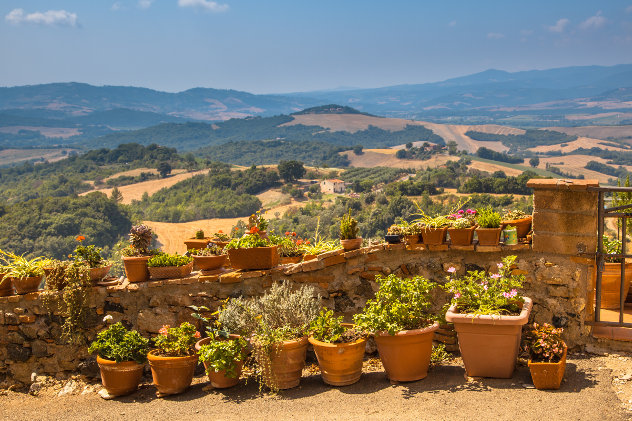Financing a Property in Italy by Foreigners: A Comparison with the UK
Giulia Rossi, Saturday, 13 January 2024

Introduction
Buying property in Italy as a foreigner, particularly for those from the UK, involves navigating a distinct set of financial and legal frameworks. Understanding these differences is crucial for a smooth property acquisition process.
Down Payment When Buying a Property in Italy
In Italy, a significant down payment is typically required when purchasing property. This often begins with a binding offer known as 'Proposta Irrevocabile di Acquisto' followed by a preliminary contract or 'Contratto Preliminare di Vendita'. The down payment, usually around 10-20% of the property's price, is a demonstration of the buyer's commitment. Unlike in the UK, where smaller deposits are common, this substantial initial outlay is a key aspect of the Italian property buying process.
Financing Contingency in Italy
A notable difference in the Italian real estate market is the general absence of financing contingencies. In the UK, it's common for property offers to be contingent on mortgage approval. In Italy, however, such contingencies are rare, and their inclusion can sometimes be viewed negatively by sellers. This lack of a financial safety net means UK buyers need to be confident in their ability to secure funding before committing to a purchase.
Mortgage Applications from the UK in Italy: Differences to the UK
UK residents looking to buy property in Italy will find the mortgage process quite different. Italian banks often have more stringent requirements for non-residents, including higher down payments and proof of income stability. Interest rates and loan terms may also vary significantly from those in the UK. Unlike the UK, where interest-only mortgages are an option, Italian mortgages typically require both interest and principal payments from the start.
Mortgage for a B&B in Italy
Financing a B&B or similar commercial property in Italy presents additional challenges. Italian banks are generally cautious about funding such ventures based solely on business plans. They usually require a proven track record of business operation and substantial personal investment. This differs from the UK, where commercial property financing might be more accessible under similar circumstances.
Requirements of Italian Banks for Mortgage Applications from Foreigners
Foreign buyers, including those from the UK, face specific requirements when applying for a mortgage in Italy. Italian banks typically require proof of stable income, good credit history, and often a residency status in Italy. The process also involves detailed financial scrutiny and can be more bureaucratic, requiring translated documents and adherence to strict legal procedures. The loan-to-value ratio (LTV) offered by Italian banks is usually lower, often between 60-80% of the property's value, meaning higher down payments compared to what might be expected in the UK.
Conclusion
Purchasing property in Italy as a foreigner, especially from the UK, requires thorough preparation and understanding of the different financing and legal landscapes. The Italian property market is characterized by significant down payments, lack of financing contingencies, and stricter mortgage application requirements. For those looking to finance a B&B or commercial property, expectations should be tempered with the understanding that Italian banks are more conservative in their lending practices for such ventures. It is highly recommended for potential buyers to seek expert financial and legal advice to successfully navigate the complexities of buying and financing property in Italy. This approach ensures informed decisions, aiding in the smooth acquisition of Italian real estate, be it for personal or commercial use.
Our comprehensive guide is the perfect companion if you are considering moving to Italy or are already living there. Learn all about buying a house, mastering the Italian language, finding a job, experiencing the culture and discovering tourist attractions. With this guide, you'll have all the information you need to live successfully in Italy. Read on now to discover it all!

Introduction
Buying property in Italy as a foreigner, particularly for those from the UK, involves navigating a distinct set of financial and legal frameworks. Understanding these differences is crucial for a smooth property acquisition process.
Down Payment When Buying a Property in Italy
In Italy, a significant down payment is typically required when purchasing property. This often begins with a binding offer known as 'Proposta Irrevocabile di Acquisto' followed by a preliminary contract or 'Contratto Preliminare di Vendita'. The down payment, usually around 10-20% of the property's price, is a demonstration of the buyer's commitment. Unlike in the UK, where smaller deposits are common, this substantial initial outlay is a key aspect of the Italian property buying process.
Financing Contingency in Italy
A notable difference in the Italian real estate market is the general absence of financing contingencies. In the UK, it's common for property offers to be contingent on mortgage approval. In Italy, however, such contingencies are rare, and their inclusion can sometimes be viewed negatively by sellers. This lack of a financial safety net means UK buyers need to be confident in their ability to secure funding before committing to a purchase.
Mortgage Applications from the UK in Italy: Differences to the UK
UK residents looking to buy property in Italy will find the mortgage process quite different. Italian banks often have more stringent requirements for non-residents, including higher down payments and proof of income stability. Interest rates and loan terms may also vary significantly from those in the UK. Unlike the UK, where interest-only mortgages are an option, Italian mortgages typically require both interest and principal payments from the start.
Mortgage for a B&B in Italy
Financing a B&B or similar commercial property in Italy presents additional challenges. Italian banks are generally cautious about funding such ventures based solely on business plans. They usually require a proven track record of business operation and substantial personal investment. This differs from the UK, where commercial property financing might be more accessible under similar circumstances.
Requirements of Italian Banks for Mortgage Applications from Foreigners
Foreign buyers, including those from the UK, face specific requirements when applying for a mortgage in Italy. Italian banks typically require proof of stable income, good credit history, and often a residency status in Italy. The process also involves detailed financial scrutiny and can be more bureaucratic, requiring translated documents and adherence to strict legal procedures. The loan-to-value ratio (LTV) offered by Italian banks is usually lower, often between 60-80% of the property's value, meaning higher down payments compared to what might be expected in the UK.
Conclusion
Purchasing property in Italy as a foreigner, especially from the UK, requires thorough preparation and understanding of the different financing and legal landscapes. The Italian property market is characterized by significant down payments, lack of financing contingencies, and stricter mortgage application requirements. For those looking to finance a B&B or commercial property, expectations should be tempered with the understanding that Italian banks are more conservative in their lending practices for such ventures. It is highly recommended for potential buyers to seek expert financial and legal advice to successfully navigate the complexities of buying and financing property in Italy. This approach ensures informed decisions, aiding in the smooth acquisition of Italian real estate, be it for personal or commercial use.
Links
Our comprehensive guide is the perfect companion if you are considering moving to Italy or are already living there. Learn all about buying a house, mastering the Italian language, finding a job, experiencing the culture and discovering tourist attractions. With this guide, you'll have all the information you need to live successfully in Italy. Read on now to discover it all!

All types of Italian property for sale by private sellers and estate agents. Find your perfect houses, farmhouses or apartment in all regions of Italy including Liguria, Tuscany, Umbria and Marche.
 Explore the charm and value of traditional rural homes in Italy's picturesque landscapes. This article delves into the unique factors that contribute
to their enduring appeal, such as breathtaking views, accessibility, location, and rich historical significance. It also addresses the challenges and
limitations in renovating these homes, emphasizing the importance of preserving their historical charm while adapting to modern conveniences. Discover
the delicate balance of renovation and the
Explore the charm and value of traditional rural homes in Italy's picturesque landscapes. This article delves into the unique factors that contribute
to their enduring appeal, such as breathtaking views, accessibility, location, and rich historical significance. It also addresses the challenges and
limitations in renovating these homes, emphasizing the importance of preserving their historical charm while adapting to modern conveniences. Discover
the delicate balance of renovation and the
More articles